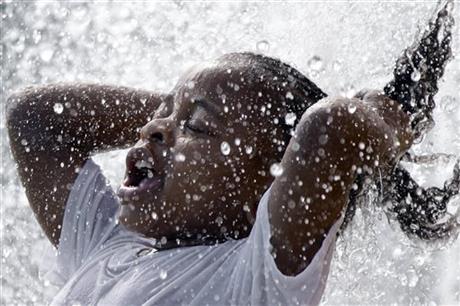 By GRANT SCHULTE
By GRANT SCHULTE
Five year-old Grace Kennedy cools off from the heat in a water fountain in Stinson Park in Omaha, Neb., Monday, Aug. 26, 2013. An unusual, late-summer heat wave enveloped much of the Midwest on Monday, putting schools and sports events on hold. Some schools in Iowa, Nebraska, Wisconsin, the Dakotas and Illinois let out early as temperatures crept toward the mid-90s, and beyond in some places. (AP Photo/Nati Harnik)
LINCOLN, Neb. (AP) — An unusual, late-summer heat wave has enveloped much of the Midwest, putting schools and sports events on hold.
Schools in Iowa, Nebraska, Wisconsin, the Dakotas and Illinois let out early on Monday as temperatures crept toward the mid-90s — beyond in some places. After-school sports practices and evening games were canceled in St. Paul, Minn., and misting stations kept people cool at the Minnesota State Fair, where about 90 fairgoers had been treated for heat-related illnesses over the weekend.
The heat wave is supposed to last through much of the week, the National Weather Service said. Heat of this magnitude is unusual for this time of year, but not unprecedented. In Des Moines, Iowa, temperatures on Aug. 26 have reached 100 degrees at least six times since 1881. The weather service said South Dakota was experiencing its hottest final week of August on record.
School districts took precautions to avoid putting students and teachers in sweaty — and possibly dangerous — situations.
In central Iowa, Marshalltown Community School District administrators canceled afternoon preschool classes on Monday and Tuesday and were planning to release other students two hours early. Parts of all 10 of district buildings have air conditioning, but some rooms aren’t connected.
“The buildings can heat up pretty fast, especially when you have kids in there,” district spokesman Jason Staker said. “It’s not a good environment for students or teachers.”
Five elementary schools in Fargo, North Dakota, canceled classes through Wednesday because the buildings weren’t fully air-conditioned. Temperatures inside them on Sunday ranged from 85 degrees to 90 degrees, Fargo Schools Superintendent Jeff Schatz said.
In South Dakota, the Sioux Falls School District continued with classes as scheduled, but spokeswoman DeeAnn Konrad said teachers kept window blinds closed and turned off lights in classrooms. The district was also prepared to move students into cooler rooms at nearby churches and a Christian school, she said.
School administrators in the western Nebraska town of Alliance decided to send students home early after local forecasters predicted temperatures in excess of 90 degrees. Some classes in the 1,600-student district are held on the third floor, and temperatures rise when students fill the room.
“It can get uncomfortable even when the temperatures are in the upper 80s,” superintendent Troy Unzicker said.
Minneapolis students attended school all day, but administrators canceled after-school activities and distributed 750 cases of water to schools. Officials also sent industrial fans to the 18 buildings that lack air conditioning, district spokeswoman Rachel Hicks said. Parents were advised to dress their kids in light clothing, while staffers watched for symptoms of heat-related illnesses.
With temperatures again forecast in the mid-90s in Minneapolis, classes Tuesday were going ahead as planned. The district said parents could keep their children at home if they felt it necessary.
In Des Moines, organizers of a downtown farmers market set for Wednesday postponed the event out concern over the extreme heat
The Iowa Department of Public Health issued a statewide advisory for vulnerable populations, including young children and the elderly. Sometimes our natural defense against extreme heat — sweat — won’t suffice, Dr. Patricia Quinlisk said.
“Especially when the humidity is high, sweat will not evaporate as quickly, preventing the body from releasing heat quickly,” she said.
___
Associated Press writer Steve Karnowski in Minneapolis contributed to this report.



